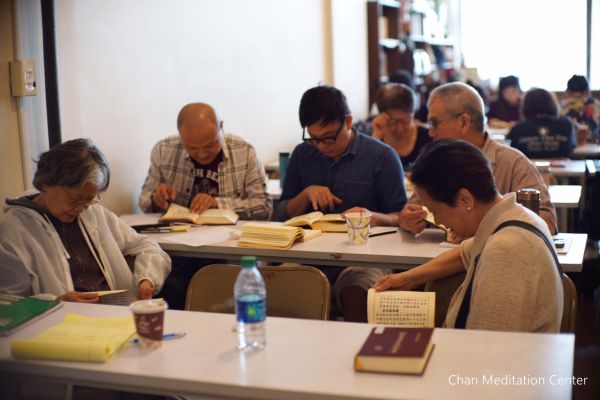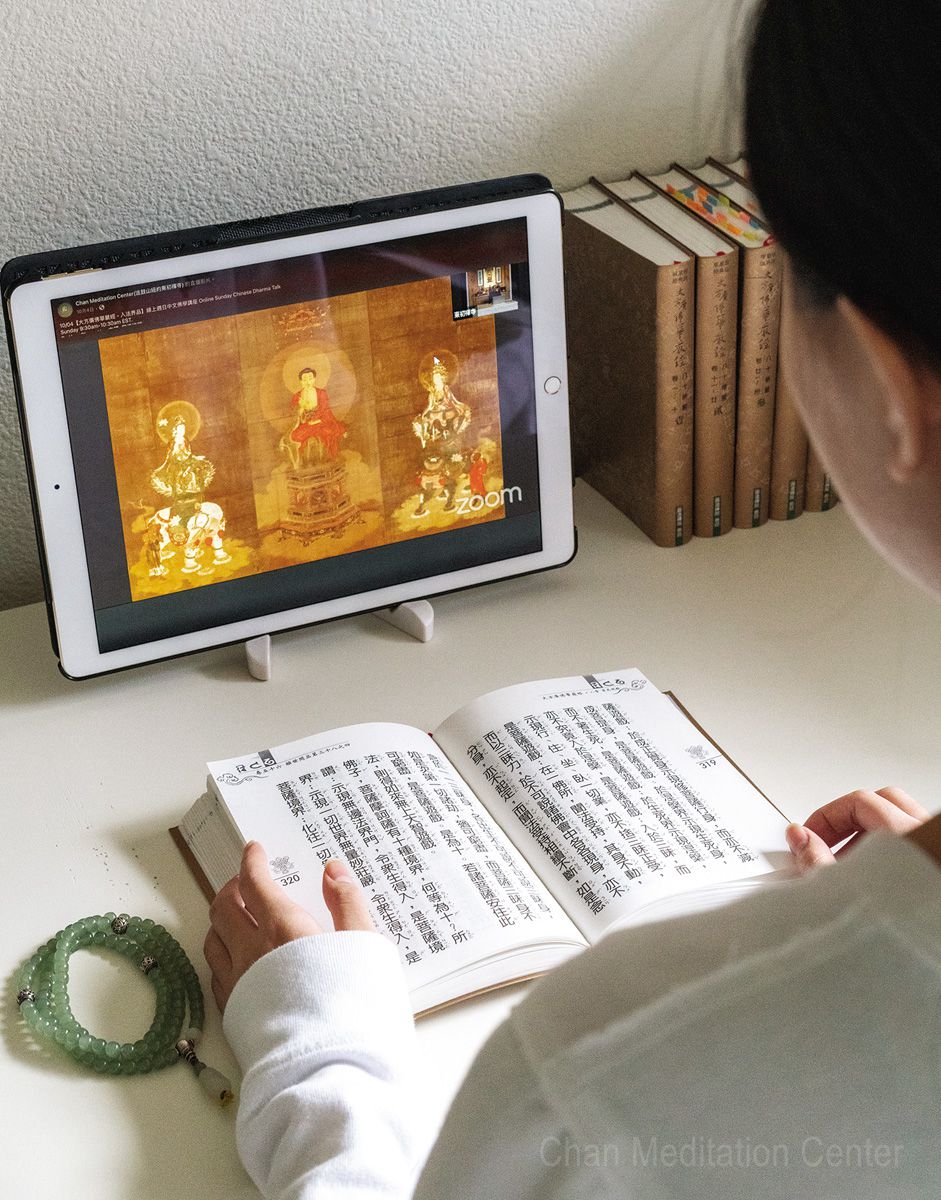Special Topics
How Do We Encounter the Buddha through Studying the Sutras?
 Some people have had the unforgettable experience of being lifted spiritually by a sentence in a Buddhist sutra when they were going through a low point in their life. Some have found new direction and refuge in life when they were lost, through the ultimate truths found in the sutras. Still others have been touched by the beauty of sutra textand thus entered the vast treasure trove of Buddhadharma. In each of these instances, although the encounter with the Buddha through the sutras was probably unanticipated, the experience was surely unforgettable. This is because one's perspective has changed at that moment. It is similar to how the sixth patriarch of the Chinese Chan tradition, Hui Neng, was enlightened when he heard someone reciting the passage "Abiding nowhere, give rise to mind" from the Diamond Sutra. The incident not only changed his life, but also changed the course of Chinese Buddhism.
Some people have had the unforgettable experience of being lifted spiritually by a sentence in a Buddhist sutra when they were going through a low point in their life. Some have found new direction and refuge in life when they were lost, through the ultimate truths found in the sutras. Still others have been touched by the beauty of sutra textand thus entered the vast treasure trove of Buddhadharma. In each of these instances, although the encounter with the Buddha through the sutras was probably unanticipated, the experience was surely unforgettable. This is because one's perspective has changed at that moment. It is similar to how the sixth patriarch of the Chinese Chan tradition, Hui Neng, was enlightened when he heard someone reciting the passage "Abiding nowhere, give rise to mind" from the Diamond Sutra. The incident not only changed his life, but also changed the course of Chinese Buddhism.The Right Attitude When Studying Sutras
 In his book, The Path to Buddhahood, Dhama Master Yinshun stated that if one has one of three attitudes, even if he or she has the opportunity to hear the Buddhadharma, it would be in vain. He used a wonderful analogy: Suppose the Buddhadharma is the rain water, and the listener is a bowl. If the bowl is placed up side down, there is no way for the rain water to fill the bowl. This shows that if the listener is inattentive or unfocused, he or she is not actually listening to the Dharma. Next, if the bowl contains dirt or toxins, even if the rain water was captured in the bowl, it cannot be used. This is analogous to the listener who has listened attentively, but with preconceived notions. Listening to the dharma may result in doubts previously sown in the listener's mind. Lastly, the bowl could have cracks in it. Even if it were clean and free of toxins, no rain water could be retained. This represents the listener who has no preconceived notions or doubts, but whose mind is scattered and preoccupied with other affairs. As soon as this person listened to the dharma, almost all of it was forgotten. Thus, studying sutras or listening to the dharma requires concentration, as well as faith in the dharma. If doubts arise, one should try to seek a resolution to those doubts. One should not allow doubts to linger in the mind while studying sutras.
In his book, The Path to Buddhahood, Dhama Master Yinshun stated that if one has one of three attitudes, even if he or she has the opportunity to hear the Buddhadharma, it would be in vain. He used a wonderful analogy: Suppose the Buddhadharma is the rain water, and the listener is a bowl. If the bowl is placed up side down, there is no way for the rain water to fill the bowl. This shows that if the listener is inattentive or unfocused, he or she is not actually listening to the Dharma. Next, if the bowl contains dirt or toxins, even if the rain water was captured in the bowl, it cannot be used. This is analogous to the listener who has listened attentively, but with preconceived notions. Listening to the dharma may result in doubts previously sown in the listener's mind. Lastly, the bowl could have cracks in it. Even if it were clean and free of toxins, no rain water could be retained. This represents the listener who has no preconceived notions or doubts, but whose mind is scattered and preoccupied with other affairs. As soon as this person listened to the dharma, almost all of it was forgotten. Thus, studying sutras or listening to the dharma requires concentration, as well as faith in the dharma. If doubts arise, one should try to seek a resolution to those doubts. One should not allow doubts to linger in the mind while studying sutras.We are not living in the Buddha's time, and do not have the opportunity to happily listento the Buddha's teaching along with Ananda, Mahakasyapa, Sariputra, Maudgalyāyana, and other great disciples under the Bodhi Tree. Yet, when we study the sutras, we are able to encounter the Buddha. "Thus I have heard" is not only uttered by Ananda. After we study the sutras, we can share with our friends, "Thus I have heard the Buddha said…"
It Is Highly Unlikely to Hear the Buddhadharma, Yet We Hear It Now
In this fast-paced day and age, it is impossible to tell what aspect of the vast teachings the Buddha gave thousands of years ago will come into people's lives and when. Hence, the expression, "The Buddha taught with one voice. Everyone takes from it in their own way." The same sentence spoken by the Buddha will be experienced differently by each listener, depending on his or her life experiences and level of understanding.
 However, even more importantly, after our encounter with the Buddha, we should let go of what we have learned in the past, and cultivate the perspective of Buddhadharma so that we can evaluate what the Buddha taught in our life experiences. Also, once we practice Buddhadharma for a prolonged period, we may lack of motivation to keep going, even if we know how wonderful the dharma is. This is a good opportunity to reflect on our own initial encounter with Buddha through the sutras, and how we were touched by it. We can bring back that Beginner's Mind and use it to motivate us in our practice of the dharma.
However, even more importantly, after our encounter with the Buddha, we should let go of what we have learned in the past, and cultivate the perspective of Buddhadharma so that we can evaluate what the Buddha taught in our life experiences. Also, once we practice Buddhadharma for a prolonged period, we may lack of motivation to keep going, even if we know how wonderful the dharma is. This is a good opportunity to reflect on our own initial encounter with Buddha through the sutras, and how we were touched by it. We can bring back that Beginner's Mind and use it to motivate us in our practice of the dharma.Resource:
50 Questions About Reading Sutras (讀經50問), Dharma Drum Publishing Corporation
